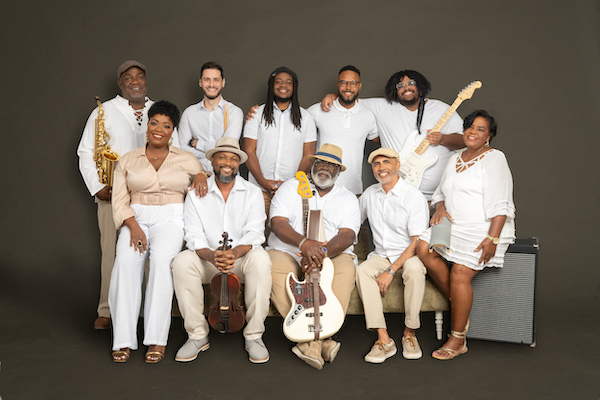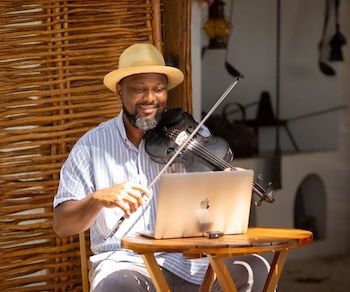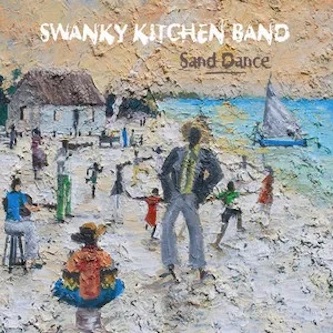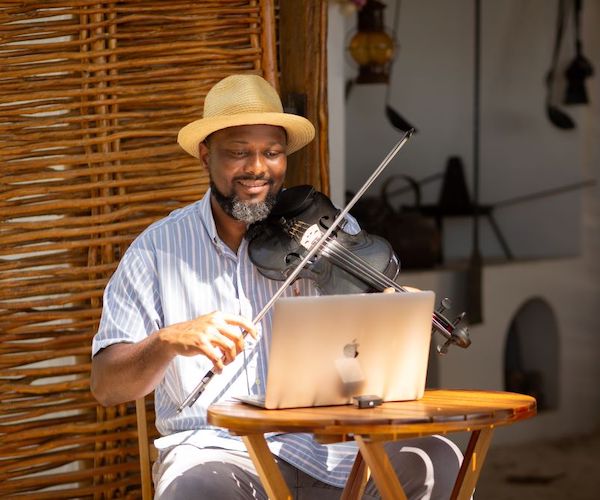By Noah Shaffer
The Swanky Kitchen Band is a Cayman Islands fiddle-led dance band single-handedly carrying on a time-honoured, yet little-known, Afro/Celtic/Caribbean tradition.

The Swanky Kitchen Band. Photo: Blue Dot Studios
The Lowell Folk Festival almost always features music from bluegrass, Irish, blues, Cajun and zydeco, but some of the festival's most memorable performances come from artists who carry on traditions most of us didn't even know existed.
Swanky Kitchen Band's upcoming appearance will certainly fall into that category. The group is single-handedly carrying on the Cayman Islands' little-known but venerable Afro/Celtic/Caribbean fiddle dance band tradition, with the island's infectiously fun fusion of Scottish/Irish fiddle and guitar tunes, African percussion, and Caribbean wordplay all coming together to create a sound like no other.
Swanky Kitchen fiddler Samuel Rose recently Arts Fuse The band has been livestreaming via Zoom while rehearsing for its East Coast tour, which includes shows in Providence on Friday and Lowell on Saturday and Sunday, as well as a workshop on Sunday afternoon called “Caribbean Crossroads: From the Bayou to the Barrio,” featuring performances from Swanky Kitchen Band, Creole dancehall masters Joe Hall & the Cane Cutters, New York's Afro Dominicano, and New Orleans funk legend Cyril Neville.
Rose began the conversation by saying that the show was a kind of homecoming for two members of Swanky Kitchen who graduated from Berklee College of Music: multi-instrumentalist Beneil Miller and drummer Jared Tibbetts.
Arts Fuse: This tradition may also be a homecoming in that it overlaps with some of the musical traditions here in New England and extends all the way to coastal Canada, where traditional dance groups play what's called kitchen party music.

Sam Rose of the Swanky Kitchen Band. Photo: Courtesy of the artist
Samuel Rose: There is a lot of synergy between the Northeast United States and the Cayman Islands. The first settlers were Scots-Irish, shipwrecked or from other islands, like Jamaica. Another group that came here, of course, were African slaves. So the Cayman Islands were not a place where many people came by choice. Many people ended up here. And they brought their culture. There are records of fiddlers playing in all three islands in the 1800s. The most vivid description of kitchen band music was part of an emancipation announcement. The document describes the kitchen fiddle, banjo, drums, and of course the grater, and claims that the sound “drowned out the roaring sea.” The most important member of our band was Miss Paula. [Scott] A lot of schooners were built in the Cayman Islands, so that's another connection to New England.
AF: The Cayman Islands fiddle tradition has almost disappeared. How did you preserve it?
Rose: You're old enough to remember video cassettes. In the days of VCRs, there was very little satellite TV, it was tapes. My mother was a musician, and she taught and played piano in the church. The church would borrow orchestra tapes, and I remember sitting on the living room floor, watching the orchestra, watching people playing, and saying, “Give me that.” It was a violin, and they gave me one for Christmas, and I started taking lessons right after. I started formal lessons in the Suzuki Method, and continued through high school. When I came home from college in 2003, someone suggested we keep traditional music alive, because at the time there was only one band left that was doing it, and the members of that band were elderly. Someone said, “When those people are gone, if we don't do this, this tradition that's been around for hundreds of years will be lost forever.” And that burden fell on my shoulders. Well, maybe I should call it a baton and a torch, not a burden.
AF: Where does the band play when they're at home? Is this dance music?
Rose: We're like a Swiss Army knife. We started out as a trio. Nicholas, the rhythm guitarist, [Johnson] is another one of the founders. If we have a 90th birthday party, we'll go out and jam with three or four people. If we have a bigger corporate event or a big national event run by the government, we'll have about 10 people with full amplifiers playing. There are a few dances that go with the music. Sadly, most of the dances have been lost. They would have been the quadrille, the pattern dance with different figures, the round dance where you twirl your partner around, the waltz, etc. Today, the quadrille is danced all over the Caribbean, and sometimes teachers come from other Caribbean islands. They teach quadrilles that are not necessarily Cayman Islands traditions. When older people hear other Caribbean versions of the quadrille, they say, “That's not ours.”
 AF: So when you started the band, music had pretty much disappeared from the island, so how did you learn the repertoire?
AF: So when you started the band, music had pretty much disappeared from the island, so how did you learn the repertoire?
Rose: Thankfully, someone had the foresight to record a few masters like fiddler Radley Garson, who performed when the Grand Ole Opry was still at the Ryman in 1987. Country music is big in Cayman, and in the '80s country music stars co-owned hotels in Cayman. Nashville Now We shot a few episodes there. We play “Folsom Prison Blues” on the show from time to time. Our first producer, Charles Gregory, also did a record with Big Al Downing. [the Black country/rockabilly pioneer who lived in Central Massachusetts for much of his life. Gregory was also, along with Swanky Kitchen Band bassist Lammie Seymour, a member of Memory of Justice, a popular Caymanian soul-reggae act that recorded with Jamaican legends Sly and Robbie in the early 80s.]And then there was “Aunt Julia” Hines, another national icon. She lived to be 106, so we got to play with her. And sometimes people would come up to us and ask if we knew the songs. So it was a learning journey.
AF: Speaking of travelling, you recently travelled to the US which led to this tour. Can you tell us how you got to the famous Old Fiddlers Convention in Galax, Virginia?
Rose: I had heard about the Old Fiddlers Convention and had seen videos about it. I couldn't travel during the pandemic, so I decided to go when the restrictions were lifted. I flew there not knowing anything about it. I'm not a bluegrass or old-time musician, so I didn't bring my fiddle and I wasn't planning on entering any contests. So I went there, walked around, and started meeting people. They were very welcoming. There weren't many people of color, but I never felt out of place. And everyone told me that I should come back next year with my fiddle. I said, I'm not just bringing my fiddle, I'm bringing my band. So in 2023, six of us came. And in the first tent, we spent time with Danny Nicely, the famous multi-instrumentalist. A guy in a baseball cap was asking me all sorts of deep questions about Cayman Islands culture and society. It turned out to be Dr. John Roman, a former Virginia folklorist and founder of the Cultural Vitality Center. [which is co-presenting the Swanky Kitchen Band’s US tour, which also includes dates at Lincoln Center and at the Blue Ridge Music Center in Galax]He and Danny have visited the Cayman Islands a few times before and things have been progressing well from there.
AF: Why do you think there's so much interest and excitement in preserving Cayman Islands kitchen music and hearing it performed live in the United States?
Rose: America has an amazing fiddle culture. I think it's intriguing to learn that there are other places out there, especially places you would never have dreamed of having. Our sound is close to what's here in some ways, but also different. It's humbling that people with this rich tradition find our little thing so special. It's like finding a family you never knew you had.
Noah Shaffer He is a Boston-based journalist and co-author of the autobiography of gospel singer Spencer Taylor Jr. The General becomes a legendHe also The Boston Globeand worked as a reporter and editor for 20 years. Massachusetts Lawyers Weekly and Worcester MagazineHe has produced three documentaries for public radio's AfroPop Worldwide, Take Us Home – Boston Roots Reggae, 1979-1988He has been nominated twice for a Boston Music Award in the Music Journalism category, and in 2022 he co-produced and wrote the liner notes for The 2022 Album of the Year. The Skippy White Story: Boston Soul 1961-1967was named one of the top box sets of the year. The New York Times.


